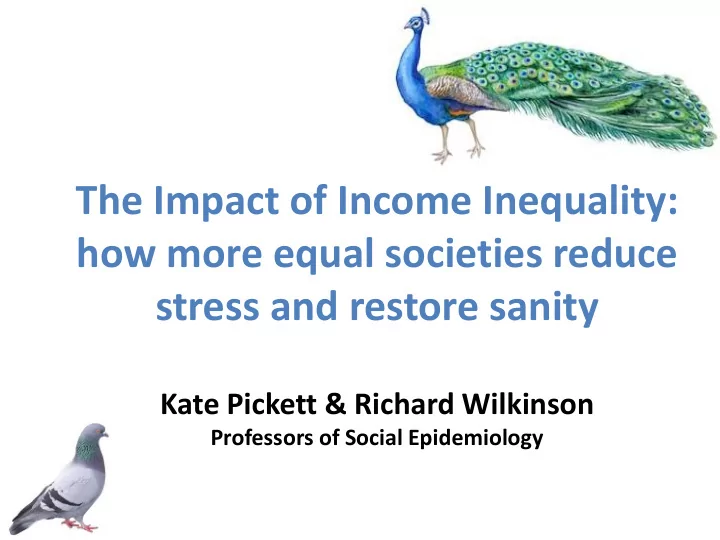

The Impact of Income Inequality: how more equal societies reduce stress and restore sanity Kate Pickett & Richard Wilkinson Professors of Social Epidemiology
Segregation in the USA African-American White Source: Census 2000; and Lewis Mumford Center, University of Albany
The Spirit Level showed • Income inequality is linked to a wide range of health and social problems • The effects are large and there are big differences between societies • Not only the poor are affected, inequality affects the whole population
Health and social problems are worse in more unequal countries Index of: Index of health and social problems • Life expectancy • Math & Literacy • Infant mortality • Homicides • Imprisonment • Teenage births • Trust • Obesity • Mental illness – incl. drug & alcohol addiction • Social mobility Wilkinson & Pickett, The Spirit Level www.equalitytrust.org.uk
Photo by kind permission of Matt Stuart
Mental Health Foundation Survey, UK 2018 74% of adults (83% of 18-24 year-olds) felt so stressed they were overwhelmed or unable to cope sometime in the past year. 32% of adults (39% of 18-24 year-olds) had suicidal feelings as a result of stress. 16% of adults (29% of 18-24 year olds) had self-harmed as a result of stress.
The Inner Level shows: • How income inequality undermines feelings of self-worth and damages mental health • How popular myths about human nature and capabilities are used to justify inequality • How we can tackle inequality and why we must do so to make the transition to sustainable wellbeing
Mental illness is more common in more unequal societies Wilkinson & Pickett, The Spirit Level www.equalitytrust.org.uk
Individual differences will explain who falls, but the height of the hurdles will explain how many fall
Robert Walker et al. Poverty in global perspective Journal of Social Policy 2013; 42, 215-233
Dominance Behavioural System
Status anxiety is higher at all income levels in more unequal countries Redrawn from Layte and Whelan (2014), data kindly provided by Richard Layte
There is more depression… 15 MS WV AL AR OK TN LA AZ DE MI 10 IL FL NV HI MO SC CA RI IN TX UT OH NM GA NE KS ME VT NY WA WY MA ID NH OR MD VA WI MT CT CO AK IA MN 5 ND Low High Income Inequality Redrawn from data in: Messias E, Eaton WW, Grooms AN. Economic grand rounds: Income inequality and depression prevalence across the United States: an ecological study. Psychiatric Services. 2011;62(7):710-712.
More people exaggerate their self- importance… High Peru Venezuela South Africa Singapore Spain Hungary USA Italy China Estonia Australia Korea Belgium Germany Japan Low Low High Income inequality Redrawn from data kindly provided by Peter Kuppens and Steve Loughnan et al . Economic inequality is linked to biased self- perception. Psychological science. 2011;22(10):1254-1258.
….and become more narcissistic 35 18 30 Top 5% income share 17 25 Income Inequality 16 20 Narcissm 15 1975 1980 1985 1990 1995 2000 2005 College students’ Narcissistic Personality Inventory scores over time reflect the rise in US income inequality
…there is more schizophrenia Burns JK, et al.. Int J Soc Psychiatry, 2013; 60(2), 185 – 96.
Addictive behaviour increases: e.g., gambling 4 Australia Singapore USA 3 Belgium Italy UK 2 Finland Canada Switzerland New Zealand Sweden Norway France 1 Germany Denmark Netherlands 0 Low High Income Inequality
There is more advertising in more unequal countries
Money and consumerism become more important High 120 Household debt, % of disposable income 100 Inequality Debt 80 Low 60 1963 1968 1973 1978 1983 1988 1993 1998 2003 Year Redrawn from data kindly provided by Iacoviello M. Household Debt and Income Inequality, 1963 – 2003. Journal of Money, Credit and Banking. 2008;40(5):929-965.
People withdraw from social interaction High Netherlands Iceland Sweden Finland Norway Ireland Denmark Luxembourg United Kingdom Cyprus Germany Slovakia France Austria Spain Czech Republic Italy Greece Estonia Portugal Latvia Hungary Poland Lithuania Low Low High Income Inequality Redrawn from data in: Lancee B, Van de Werfhorst HG. Income inequality and participation: A comparison of 24 European countries. Social science research. 2012;41(5):1166-1178.
Reproduced with kind permission of Kate Pybus, PhD student, University of York
World's 26 richest people own as much as poorest 50%, says Oxfam Photo: Bloomberg via Getty Images
BRITAIN’S BIG SQUEEZE In Britain, Even Children Are Feeling the Effects of Austerity By Patrick Kingsley New York Times, Sept. 26, 2018 Waiting for lunch at Morecambe Bay Primary School in Morecambe, England. About a third of the school’s 350 students would not have breakfast unless the school provided it, one teacher said. Credit: Laura Boushnak for The New York Times
www.equalitytrust.org.uk
Shut out of society, young Londoners talk to UN poverty envoy United Nations rapporteur Philip Alston with Young Equality Campaigners in London Photo: Ealing Council
Recommend
More recommend